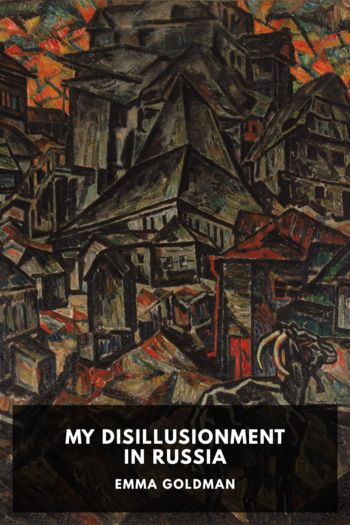Journey from St. Petersburg to Moscow Irina Reyfman (snow like ashes .TXT) 📖

- Author: Irina Reyfman
Book online «Journey from St. Petersburg to Moscow Irina Reyfman (snow like ashes .TXT) 📖». Author Irina Reyfman
“Mr. Assessor, descended from the lowest class, found himself to be the master of several hundred of his fellow human beings. This turned his head. He would not be the only one to protest that the exercise of power turns one’s head. He regarded his own rank as the highest, regarded the peasants as livestock given to him to be deployed as labor at his discretion (it is not unlikely that he considered that his power over them derived from God). He was mercenary, squirreling away money, cruel by nature, querulous, base, and therefore arrogant toward the very weakest. You can judge from this how he got on with the peasants. Under the previous landowner they had been on a quitrent basis; he settled them on a tillage basis. He confiscated all their land, bought from them their livestock at a price he set himself, obliged them to work the entire week for him, and, to prevent them from dying of starvation, fed them in the courtyard of the manor house, and then not more than once daily, and to some he gifted a monthly charitable allowance. If anyone looked lazy to him, he birched, whipped, clubbed, and beat them with a cat-o’-nine-tails calibrated to the degree of indolence. When it came to real crimes such as theft from others than himself, he said not a word. It looked as though he wanted in his village to revive the ways of ancient Sparta or the Zaporozhian Host.56 It came to pass that for subsistence his peasants robbed one traveler and then later killed another. He did not surrender them to justice but hid them at home, telling the authorities that they had fled. He maintained that he would not profit if a peasant of his were to be lashed with the knout and sent to do hard labor for a crime. If one of his peasants committed robbery against him, he whipped him as he did for indolence or for making a bold or witty challenge and in addition put them in the stocks, clapped their legs in chains, and put a harness around their neck. I could tell you many a tale of the clever orders he gave, but this will suffice to introduce you to my hero. His consort maintained total power over the womenfolk. Her abettors in implementing her orders were her sons and daughters, as they were for her husband. This was because they had made it a rule on no account to distract their peasants from work. For domestic staff, they had a boy purchased in Moscow, a hairdresser for their daughters, and an elderly female cook. They had neither a coachman nor horses; they always used the draft horses to travel. The sons personally birched the peasants or whipped them with a cat-o’-nine-tails. The daughters slapped the women and girls on the face, or pulled their hair. In their free time, the sons roamed the village or the fields to flirt and to debauch girls and women, and none could escape being raped by them. Because the daughters did not have suitors, they vented their frustration on the spinning women, many of whom they disfigured. My friend, judge for yourself what outcome deeds like these might have. From a large number of cases, I have established that the Russian people are extremely patient and will remain patient to the very limit. But when their patience is at an end then nothing can avert them from turning to cruelty. This is precisely what happened with the assessor. The terrible and senseless—or perhaps it would be better to say beastly—act of one of his sons provided such a cause.
“In his village there lived a young peasant wench. She was not bad looking, and promised in marriage to a young peasant of the same village. The middle son of the assessor fancied her, and he did everything he could to woo her affections. But the peasant girl was faithful, having plighted her troth to her groom, a rare thing that does occasionally happen among the peasantry. The wedding was due to take place on a Sunday. According to the custom introduced by many landowners, the father of the groom accompanied his son to the manor house and brought with him two poods* of honey as a bridal tribute to his master. This was the moment the young master decided to use in order to satisfy his own lust. He took along his two brothers, used a strange boy as intermediary to lure her into the courtyard, gagged her while dragging her into a pen. Unable to cry out, she resisted with all her might the ferocious intention of her young master. Overwhelmed in the end by all three, she was coerced into submitting to their violence, and thus it was that when the horrid monster was on the brink of satisfying his intention, the bridegroom returned from the manor house, entered the courtyard, and, spotting one of the young masters near the pen, became suspicious about their evil plan. He called for his father to come help and then quicker than lightning flew to the pen. What a sight awaited him! As he approached, the door to the pen closed shut but the combined strength of two brothers was unequal to contain the headlong charge of the enraged groom. He grabbed a stake lying nearby, jumped into the pen and bashed on the back his bride’s predator. They were about to grab him but when they saw the groom’s father running, also with a stake in hand, to his aid, they abandoned their prey,





Comments (0)